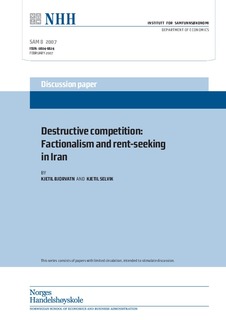| dc.contributor.author | Selvik, Kjetil | |
| dc.contributor.author | Bjorvatn, Kjetil | |
| dc.date.accessioned | 2007-06-20T11:00:36Z | |
| dc.date.available | 2007-06-20T11:00:36Z | |
| dc.date.issued | 2007-02 | |
| dc.identifier.issn | 0804-6824 | |
| dc.identifier.uri | http://hdl.handle.net/11250/163314 | |
| dc.description.abstract | Empirical evidence shows that countries richly endowed with natural
resources like oil and gas tend to have slower economic growth
than resource poor countries. The present paper focuses on rentseeking
as a source of the “resource curse”, using Iran as a case in
point. Iran is an interesting case, both because it is a rentier economy
in the oil rich Middle East, and because its political system is
highly factionalized. The distortions from the factionalized political
system are threefold. First, resources are wasted in the competition
for rents. Second, the lack of property rights protection results in less
(private) investment at the aggregate level. Third, imbalances in the
distribution of political power between groups lead to a distortion in the allocation of investment funds. | en |
| dc.language.iso | eng | en |
| dc.publisher | Norwegian School of Economics and Business Administration. Department of Economics | en |
| dc.relation.ispartofseries | Discussion paper | en |
| dc.relation.ispartofseries | 2007:8 | en |
| dc.subject | resource curse | en |
| dc.subject | factionalization | en |
| dc.subject | rent seeking | en |
| dc.subject | oil revenues | en |
| dc.subject | Iran | en |
| dc.title | Destructive competition : factionalism and rent-seeking in Iran | en |
| dc.type | Working paper | en |
| dc.subject.nsi | VDP::Samfunnsvitenskap: 200::Økonomi: 210::Samfunnsøkonomi: 212 | en |
